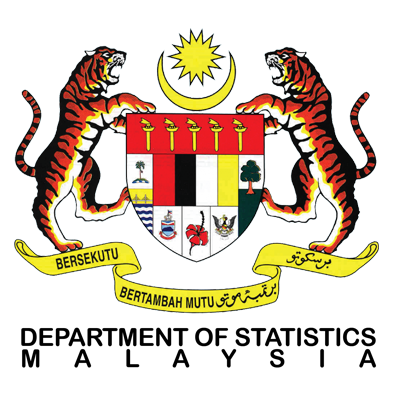Malaysia External Trade Statistics
- Home
- Statistics
- Economy
- External Sector
- Malaysia External Trade Statistics
Malaysia External Trade Statistics November 2019
Malaysia External Trade Statistics October 2019 4 November 2019
Malaysia External Trade Statistics September 2019 4 October 2019
Malaysia External Trade Statistics August 2019 4 September 2019
Malaysia External Trade Statistics July 2019 2 August 2019
Malaysia External Trade Statistics Jun 2019 4 July 2019
Malaysia External Trade Statistics May 2019 Show all release archives
Overview

KEY FACTS
- Malaysia’s exports in November 2019, decreased 5.5% to RM80.8 billion year-on-year (y-o-y). Re-exports was valued at RM13.0 billion registering a decline of 18.4% y-o-y and accounted for 16.1% of total exports. Domestic exports also recorded a decrease of 2.6% or RM1.8 billion to RM67.8 billion.
- Imports also slipped 3.6% y-o-y to RM74.3 billion.
- On a month-on-month (m-o-m) basis, exports declined 10.8% from RM90.6 billion. In seasonally adjusted terms, exports also decreased 11.2%.
- On a m-o-m basis, imports increased 1.4% or RM993.1 million from RM73.3 billion. In seasonally adjusted terms, imports increased 4.8%.
- On a y-o-y basis, exports fell due to the decrease in exports to Singapore (-RM1.6 billion), Hong Kong (-RM1.3 billion),Japan (RM959.4 million), Thailand (-RM699.1 million) and Republic of Korea (-RM633.5 million). However, exports increased to China (+RM495.6 million) and the United States (+RM479.1 million).
- On a y-o-y basis, lower imports were mainly from the European Union (-RM1.1 billion), Saudi Arabia (-RM1.0 billion), Singapore(RM834.6 million), Taiwan (-RM602.3 million), Thailand (-RM587.6 million) and Indonesia (-RM586.8 million). Meanwhile, higher imports were from China (+RM1.7 billion) and United Arab Emirates (+RM1.1 billion).
TRADE
Total trade amounted at RM155.1 billion, a contraction of 4.6% or RM7.5 billion in November 2019. It also posted a decline of RM8.8 billion (-5.4%) when compared to October 2019. The trade surplus which was valued at RM6.5 billion, shrank RM2.0 billion (-23.1%) from a year ago. It also registered a decrease of RM10.8 billion or 62.3% as compared to the previous monthTotal trade amounted at RM155.1 billion, a contraction of 4.6% or RM7.5 billion in November 2019. It also posted a decline of RM8.8 billion (-5.4%) when compared to October 2019. The trade surplus which was valued at RM6.5 billion, shrank RM2.0 billion (-23.1%) from a year ago. It also registered a decrease of RM10.8 billion or 62.3% as compared to the previous month.
EXPORTS
On a y-o-y basis, exports decreased 5.5% to RM80.8 billion. The main products which attributed to the decline were:
- Electrical and electronic (E&E) products (34.1% of total exports), slipped RM3.6 billion (-11.6%) to RM27.6 billion;
- Liquefied natural gas (LNG), which accounted for 4.0% of total exports declined RM1.8 billion or 35.9% to RM3.2 billion due to the decrease in both average unit value (-24.1%) and export volume (-15.6%);
- Refined petroleum products, which accounted for 6.6% of total exports, decreased RM1.2 billion or 19.0% to RM5.3 billion due to the decrease in both average unit value (-15.4%) and export volume (-4.3%);
- Crude petroleum, which contributed 2.7% to total exports dropped RM669.0 million or 23.4% to RM2.2 billion due to the decline in both average unit value (-18.7%) and export volume (-5.7%);
- Palm oil and palm oil-based products (6.7% of total exports), shrank RM144.2 million (-2.6%) to RM5.4 billion. However, exports of palm oil, the major commodity in this group of products rose marginally RM34.1 million or 1.1% due to the increase in export volume (+2.1%) as average unit value decreased 1.0%; and
- Natural rubber (0.3% of total exports) decreased RM32.3 million or 10.6% to RM272.5 million due to the decline in both export volume (-10.3%) and average unit value (-0.3%).
However, exports of timber and timber-based products, which accounted for 2.5% of total exports increased RM53.7 million or 2.7%.
On a m-o-m basis, exports declined RM9.8 billion (-10.8%) from RM90.6 billion. The main products which contributed to the decrease were:
- E&E products dropped RM9.8 billion (-26.2%) from RM37.4 billion;
- LNG, declined RM412.7 million (-11.4%) from RM3.6 billion due to the decrease in both export volume (-8.6%) and average unit value (-3.0%);
- Palm oil and palm oil-based products decreased RM190.7 million or 3.4% from RM5.6 billion. Exports of palm oil shrank RM70.5 million or 2.2% due to the lower in export volume (-3.9%) as average unit value rose 1.8%;
- Timber and timber-based products fell RM62.6 million (-3.0%) from RM2.1 billion; and
- Natural rubber decreased RM27.6 million or 9.2% from RM300.0 million due to the decrease in both export volume (-6.2%) and average unit value (-3.2%).
Nevertheless, the following products recorded an increase:
- Refined petroleum products increased RM427.5 million or 8.8% from RM4.9 billion due to the increase in both export volume (+7.2%) and average unit value (+1.5%); and
- Crude petroleum grew RM318.8 million or 17.0% from RM1.9 billion due to the growth in export volume (+19.5%) as average unit value decreased 2.1%.
Exports to Country of Destination
The two major destinations for Malaysia’s exports in November 2019 were China and Singapore.
Exports to China amounted to RM12.5 billion, which accounted for 15.5% of total exports, increased RM495.6 million (+4.1%) as compared to the previous year. The main products which attributed to the rise were:
- Iron and steel bars, rods, angles, shapes and sections, which contributed 2.3% of total exports surged RM289.4 million from RM58.0 thousand; and
- Ingots and other primary forms, of iron or steel (3.1% of total exports), increased RM282.4 million to RM388.7 million.
Exports to Singapore which were valued at RM11.5 billion declined RM1.6 billion (-12.5%). The main product which attributed to the decrease was E&E products, which contributed 39.4% of total exports fell RM1.4 billion (-23.4%) to RM4.5 billion.
Seasonally Adjusted Export Value
On a m-o-m basis seasonally adjusted terms, exports declined RM9.8 billion (-11.2%) to RM77.2 billion.
Exports, 2015-2019

IMPORTS
On a y-o-y basis, imports declined RM2.8 billion or 3.6% to RM74.3 billion. The decline in imports was mainly attributed to capital goods.
- Capital Goods
Imports of capital goods, which accounted for 13.2% of total imports, dropped RM443.2 million (-4.3%) to RM9.8 billion due to the decline in both transport equipment, industrial (-RM289.8 million, -21.1%) and capital goods (except transport equipment) (-RM153.4 million, -1.7%).
- Consumption Goods
Imports of consumption goods which constituted 9.1% of total imports recorded an increase of RM125.9 million (+1.9%) to RM6.8 billion. The growth was mainly attributed to food & beverages, primary, mainly for household consumption (+RM144.0 million, +18.7%), and non-durables (+RM82.0 million, +5.0%). However, imports of durables decreased RM97.5 million or 9.6%.
- Intermediate Goods
These goods which constituted 55.2% of total imports rose RM727.1 million (+1.8%) to RM41.0 billion. The increase was mainly attributed to parts & accessories of capital goods (except transport equipment) (+RM1.7 billion, +14.2%) and industrial supplies, primary (+RM947.5 million, +44.2%). However, fuel & lubricants, processed, others and fuel & lubricants, primary decreased RM947.0 million (-36.9%) and RM629.7 million (-26.3%) respectively.
On a m-o-m basis, imports increased RM993.1 million or 1.4% from RM73.3 billion. All main categories of imports by end use recorded increases.
- Intermediate Goods
These goods soared RM3.5 billion (+9.3%) from RM37.5 billion. The main components contributed to the increase were parts & accessories of capital goods (except transport equipment) (+RM5.3 billion, +61.6%). Nevertheless, imports of fuel & lubricants, primary and industrial supplies, processed recorded a decrease of RM628.0 million (-26.2%) and RM517.8 million (-3.1%) respectively.
- Capital Goods
Imports of capital goods increased RM1.3 billion (+15.4%) from RM8.5 billion due to the increase in both capital goods (except transport equipment) (+RM763.8 million, +9.6%) and transport equipment, industrial (+RM545.2 million, +100.8%).
- Consumption Goods
Imports of these goods registered an increase of RM625.9 million (+10.2%) from RM6.1 billion. The increase was due to durables (+RM183.4 million, +25.0%), semi-durables (+RM179.5 million, +16.6%), and food & beverages, processed, mainly for household consumption (+RM146.5 million, +8.5%).
Imports by Country of Origin
The two main sources of Malaysia’s import in November 2019 were China and Singapore.
Imports from China which registered RM16.6 billion rose RM1.7 billion (+11.5%) when compared to November 2018. The main products which attributed to the growth were:
- Refined petroleum products (8.0% of total imports), increased RM1.2 billion to RM1.3 billion; and
- E&E products, which contributed 36.8% of total imports grew RM316.8 million or 5.5% to RM6.1 billion.
Imports from Singapore amounted to RM8.4 billion decreased RM834.6 million (-9.1%) from a year ago. The main product which attributed to the decrease were refined petroleum products (35.1% of total imports), decreased RM789.2 million or 21.2% to RM2.9 billion.
Seasonally Adjusted Import Value
On a m-o-m basis seasonally adjusted terms, imports increased RM3.3 billion (+4.8%) to RM73.3 billion.
Imports, 2015-2019

MARKET SHARE
The following charts show Malaysia's major trading partners for January - November 2019.
Total Trade by Major Countries, Jan – Nov 2019, percentage share

Exports and Imports by Major Countries, Jan – Nov 2019, percentage share

The following charts show Malaysia’s trade with ASEAN countries for the period January - November 2019.
Exports, Jan – Nov 2019, percentage share

Imports, Jan – Nov 2019, percentage share

#Notes:
1. The November 2019 data is provisional and subject to revision in later issues.
2. This report can be accessed through the web portal of the Department of Statistics, Malaysia (https://www.dosm.gov.my) under section: Latest Release.
Released By:
DATO' SRI DR. MOHD UZIR MAHIDIN
CHIEF STATISTICIAN MALAYSIA
DEPARTMENT OF STATISTICS, MALAYSIA
![]() DrUzir_Mahidin
DrUzir_Mahidin ![]()
![]() Dr_Uzir
Dr_Uzir
3 JANUARY 2019
Contact person:
Rohaida binti Mohamad
Public Relation Officer
Strategic Communication and International Division
Department of Statistics, Malaysia
Tel : +603-8885 7942
Fax : +603-8888 9248
Email : rohaida.mohamad[at]dosm.gov.my
Subscribe
Newsletter
Subscribe to our newsletter and stay updated
For interviews, press statement and clarification to the media, contact:
Baharudin Mohamad
Public Relation Officer
Email: baharudin[at]dosm.gov.my
Phone: 03 8090 4681
Not found what you looking for? Request data from us, through
Go to eStatistik
Email: data[at]dosm.gov.my
Phone: 03 8885 7128 (data request)










